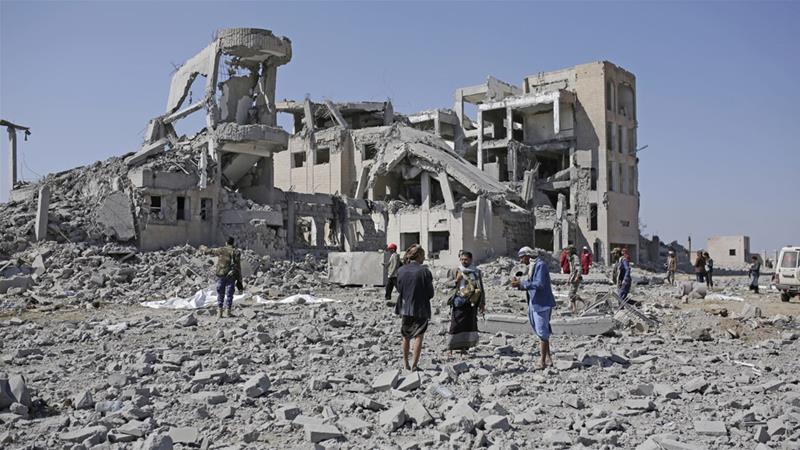By Akanimo Sampson
The COVID-19 pandemic poses serious risks for women in Yemen, who are often tasked with caring for the ill.
In Yemen, health workers, already stretched to the limit by five years of grinding conflict, are sounding the alarm that the COVID-19 pandemic could spell catastrophe for the country.
Last April 10, the country announced its first laboratory-confirmed case of the ravaging disease. Since then, 34 more cases and seven deaths have been reported.
Dr. Amani Omar, at Azan Health Centre in rural Hajjah says “if the coronavirus spreads in Yemen, it will be a humanitarian disaster beyond our imagination.” She is the facility’s first-ever female general physician.
“As doctors, we know how disastrous it would be. We do not have the facilities or minimum health standards to treat the virus. We do not have oxygen. We do not have ventilators. We do not have intensive care units,” she said.
Yemenis are already living through the worst humanitarian crisis in the world. The health system is on the verge of collapse, with nearly half of all health facilities non-functioning or only partially functioning.
Equipment and medical supplies are inadequate or obsolete, and health workers have gone without pay or received irregular pay for more than two years.
Yet even with the pandemic’s arrival in the country, funding for humanitarian work – including health care – is drying up.
At the start of this year, the United Nations Population Fund (UNFPA) appealed for $100.5 million for its regular humanitarian operations in Yemen. To date, only 41 per cent of that has been mobilized, leaving a gap of $58.8 million. An additional $24 million is needed for the COVID-19 response, including protecting health workers and shoring up access to reproductive health care.
UNFPA’s Acting Representative in Yemen, Nestor Owomunhangi, says “our priority is to ensure that access to reproductive health care for these women is not disrupted and that they are protected from violence and abuse during these difficult times. We can, however, only do so if funding is available.
“Under the pandemic, attention has understandably been diverted away from the devastation in Yemen. But we cannot look away – especially now.”
Women and girls are facing serious threats to their reproductive health. Only 20 per cent of the health system is providing maternal and child health services. It is estimated that a woman dies of pregnancy- or childbirth-related complications every two hours in Yemen.
Last year, UNFPA supported 235 health facilities and 3,800 reproductive health workers. This support included essential reproductive health medicines, equipment and support with operational costs. More than 1.5 million women and girls were reached with reproductive health services as a result.
Much of this support could be rolled back if funding does not materialize by mid-May. An estimated 140 reproductive health facilities may be forced to close. Without funding, 90 per cent of UNFPA’s reproductive health services could be closed by July. This could cut off as many as 320,000 pregnant women from the reproductive health care they need.
These shortfalls arrive just as UNFPA is trying to scale up its support to the country’s health system to address the pandemic. Women are expected to bear the brunt of a COVID-19 outbreak, should one occur.
“Five years of conflict, limited nutritional intake and low levels of immunity are making Yemeni women increasingly vulnerable to contracting COVID-19,” said Owomunhangi.
Strict gender roles mean that women and girls will likely be tasked with caring for the sick, which will put them at risk of infection. Women and girls also have less access to financial resources and decision-making, meaning they may be less able to seek health services if they fall ill.
In addition, the most basic preventative measure – handwashing – is not an option for many. More than 9.1 million women and girls need support to meet their basic water, sanitation and hygiene needs. Soaring prices and reduced purchasing power are also putting clean water and personal hygiene items out of reach for the most vulnerable.
Health workers in Yemen have already endured extraordinary trials during the country’s conflict.
“A health worker sees death more than once a day. It can be on the way to work, it can be inside the hospital,” Dr. Omar told UNFPA. Some health facilities have been the target of attacks, she said. “We lived in horror. The years to come will not be able to erase these memories.”
If the pandemic spreads widely, health workers will again find themselves at grave risk.
“We lack qualified personnel who know how to deal with the virus, and as well as we lack protection and safety equipment for health workers and cleaners,” said Fatima Yahya Ahmed, a midwife in Abs, near front lines. “We are scared.”
Despite everything, Ms. Ahmed says she is undeterred.
“I have risked my life during heavy bombing to save many mothers from complicated pregnancies. I do not have protection equipment or enough knowledge about this virus, but I am ready to continue to risk my life to save mothers and their babies.”
UNFPA has already launched its COVID-19 response in the country, sending critical medical supplies, hygiene and sanitary items, and personal protective equipment for health-care workers. So far 114 health facilities have received equipment. Some 40 ventilators have been supplied, and another 40 are on the way. Funding to continue these efforts is urgently required.

